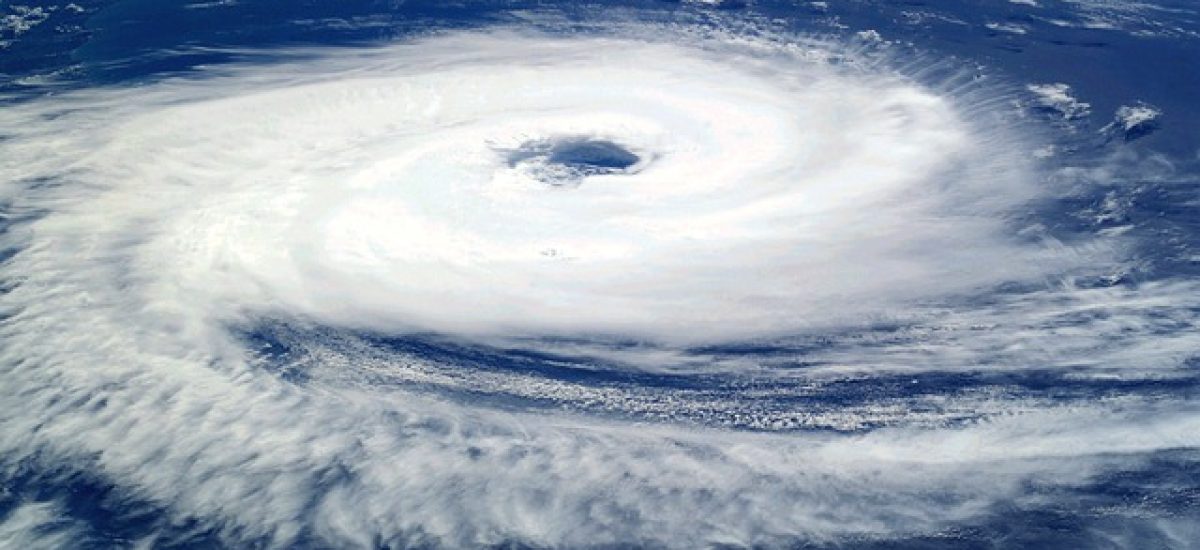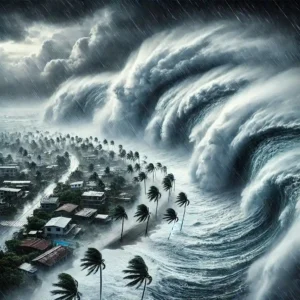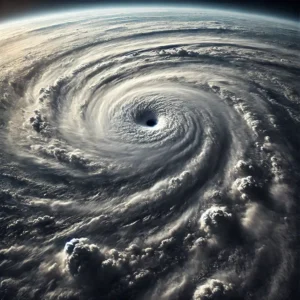Why is the Caribbean one of the places with the greatest cyclonic activity?
The Caribbean, known for its beauty and tourist attraction, faces high cyclonic activity. This climate reality deeply impacts its inhabitants, causing interruptions in daily routines, damage to infrastructure and security risks.
In this article, we will explore why the Caribbean experiences this cyclonic activity, analyze the history of cyclones in the region, evaluate their impacts, and discuss their relationship to climate change. In addition, we will provide you with tips to be prepared and maintain the safety of your family and your assets in times of cyclones.
Table of Contents
What is cyclonic activity?
Cyclonic activity is a term used to describe the development of tropical cyclones in a specific region, in this case, the Caribbean. A tropical cyclone is a weather system characterized by the closed and organized circulation of winds, which move around a low pressure center, known as the "eye."
These systems form over warm waters and, when atmospheric conditions are favorable, they can gain strength and evolve into tropical storms or hurricanes.
In the context of the Caribbean, cyclonic activity primarily refers to the formation and passage of tropical storms and hurricanes through this region. These weather events are common during hurricane season, which generally runs from June through November.
How is it classified?
Cyclonic activity is classified into different categories depending on the intensity and speed of the wind. Tropical storms, for example, have sustained winds ranging between 39 and 73 miles per hour (63 and 118 kilometers per hour), while hurricanes, at their peak, can have sustained winds of 74 miles per hour (119 kilometers per hour). per hour) or more.
Factors contributing to cyclonic activity in the Caribbean
Cyclonic activity in the Caribbean is the result of a combination of meteorological and geographic factors that make this region prone to the formation and passage of tropical storms and hurricanes. Below, we will explore some of the main factors that contribute to high cyclonic activity in the Caribbean:
Water temperature
One of the key conditions for the formation and strengthening of tropical cyclones is the warm temperature of ocean water. The Caribbean, with its warm waters for much of the year, provides the environment for the development of tropical storms and hurricanes. Hot water acts as fuel for these systems, feeding them and allowing them to grow in intensity.
Temperature change in the atmosphere
The difference in temperature between the air at the sea surface and the air in the upper atmosphere plays a crucial role in the formation of storms. When this difference is significant, it facilitates the rise of warm, moist air from the ocean surface, which can lead to the formation of low pressure areas and, eventually, tropical cyclones.
Wind patterns
Winds in the upper atmosphere are also important. A change in the direction and speed of these winds can influence the path and development of cyclones. In the Caribbean, favorable wind patterns can lead to storms intensifying and moving into the region.
Geographic location
The geographic location of the Caribbean places it in a favorable position for cyclonic activity. The region is surrounded by water, allowing cyclones to form and intensify in the ocean before approaching islands and the mainland coast.
Climate change
While cyclonic activity in the Caribbean has long been a natural feature of the region, global climate change is casting new uncertainties on the intensity and frequency of these events. Rising ocean temperatures and altered atmospheric patterns can influence cyclonic activity.
Do you want to know a little more about this and other topics?
If you would like to learn more about this topic and explore a wide variety of other interesting topics, we invite you to visit our Blog. On our blog, you will find a wealth of informative and entertaining articles that will keep you informed and entertained.
Feel free to explore our blog and expand your knowledge on a wide range of exciting topics!

History of cyclones in the Caribbean
The Caribbean has a long history of dealing with tropical cyclones, dating back centuries. The indigenous people who inhabited these islands before the arrival of Europeans also experienced these natural phenomena. However, historical documentation of cyclones in the region began with European colonization.
One of the most notorious cyclones in Caribbean history was the Great Hurricane of 1780. This hurricane, which reached Category 5 on the Saffir-Simpson hurricane scale, is one of the deadliest hurricanes in recorded history, claiming the lives of thousands of people and causing catastrophic damage in the Caribbean islands and the southeastern United States.
Over the years, the region has been hit by numerous cyclones, some of which have left an indelible mark on the collective memory of Caribbean communities. These events have led to greater recognition of the need for effective preparedness and response to cyclonic threats.
Impacts of cyclonic activity in the Caribbean
Cyclonic activity in the Caribbean can have a number of significant impacts on the region. These impacts range from property damage and loss of life to disruptions to infrastructure and the economy. Some of the main impacts of cyclones in the Caribbean include:
Damage to housing and infrastructure: Tropical cyclones can destroy or severely damage homes, buildings, roads, bridges and other infrastructure. Flash flooding and strong winds can wreak havoc on local communities.
Floods: Torrential rains associated with cyclones can cause flash floods and landslides in mountainous areas. These floods can be devastating and cause the evacuation of entire communities.
Loss of life: Tropical cyclones often result in tragic loss of human life. This may be due to falling debris, flooding, or hazardous conditions during the storm.
Economic losses: Damage caused by cyclones can have a significant impact on the Caribbean economy. The repair of damaged infrastructure and loss of income due to the interruption of economic activities can have long-term effects.
Population displacement: Faced with the threat of a cyclone, many people are forced to evacuate their homes and seek refuge in safe areas. This can lead to temporary or prolonged displacement of the population.
Damage to the environment: Cyclones can also cause damage to the environment, including coastal erosion, degradation of coral reefs, and water pollution due to stormwater runoff.
Preparation and safety
Preparation and safety are essential when it comes to dealing with cyclonic activity in the Caribbean. Here are some key steps that individuals and communities can take to protect themselves:
Family planning: Each family should have an emergency plan that includes evacuation routes, an emergency supply kit, and a meeting place. Make sure all family members know what to do in the event of a cyclone.
Safe haven: Identify a safe haven in your local area and know its location. Shelters are usually schools or public buildings designated for emergencies.
Supply Kits: Prepare an emergency supply kit that includes water, non-perishable food, flashlight, batteries, first aid kit, and baby supplies if necessary.
Home protection: Reinforce your home if necessary to resist high winds. This may include installing blinds or wooden planks on windows and doors.
Sure: Make sure you have adequate insurance that covers storm damage. Review your policy and make sure you understand the details of your coverage.
Constant monitoring: Stay informed about the path and intensity of cyclones through reliable sources such as meteorological services and emergency management agencies.
In addition to these preparedness measures, it is important to have a reliable emergency generator.
Power outages are common during cyclones and can last for days or weeks. An emergency generator, especially one that runs on diesel, can power your home or business during these difficult times, allowing you to keep the lights on, food chilled, and critical devices running.
Do you need advice?
Safety and preparation are essential when it comes to dealing with cyclonic activity in the Caribbean. In JRH Power Generator, we are committed to helping you protect your family and your assets in the event of an emergency. Our diesel generators They are a reliable source of power during power outages caused by cyclones and storms.
Do not hesitate to contact one of our advisors. Your safety is our priority.

Hurricane season is a critical period for Puerto Rico, and being prepared can make the difference between safety and danger. In

Understanding how a hurricane forms allows us to be one step ahead and prevent the devastating effects of these natural phenomena. Especially in areas

In a world where energy efficiency is increasingly a priority, learning to save energy has become a crucial need for both

In a world that doesn't stop, the need for a reliable and continuous power source is more crucial than ever. At JRH Power

Have you ever wondered how electricity becomes a constant in our lives, even in the most critical moments? At JRH Power

In our modern world, where electricity is vital, power outages are a frequent reality. Know how to connect a generator to the house

